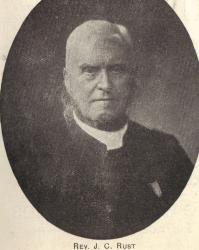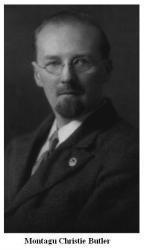Planning worship?
Check out our sister site, ZeteoSearch.org,
for 20+ additional resources related to your search.
- |
User Links
Person Results
H. W. Baker

1821 - 1877 Person Name: K-ro Henry Williams Baker Author of "Dia vorto restas" in TTT-Himnaro Cigneta Baker, Sir Henry Williams, Bart., eldest son of Admiral Sir Henry Loraine Baker, born in London, May 27, 1821, and educated at Trinity College, Cambridge, where he graduated, B.A. 1844, M.A. 1847. Taking Holy Orders in 1844, he became, in 1851, Vicar of Monkland, Herefordshire. This benefice he held to his death, on Monday, Feb. 12, 1877. He succeeded to the Baronetcy in 1851. Sir Henry's name is intimately associated with hymnody. One of his earliest compositions was the very beautiful hymn, "Oh! what if we are Christ's," which he contributed to Murray's Hymnal for the Use of the English Church, 1852. His hymns, including metrical litanies and translations, number in the revised edition of Hymns Ancient & Modern, 33 in all. These were contributed at various times to Murray's Hymnal, Hymns Ancient & Modern and the London Mission Hymn Book, 1876-7. The last contains his three latest hymns. These are not included in Hymns Ancient & Modern. Of his hymns four only are in the highest strains of jubilation, another four are bright and cheerful, and the remainder are very tender, but exceedingly plaintive, sometimes even to sadness. Even those which at first seem bright and cheerful have an undertone of plaintiveness, and leave a dreamy sadness upon the spirit of the singer. Poetical figures, far-fetched illustrations, and difficult compound words, he entirely eschewed. In his simplicity of language, smoothness of rhythm, and earnestness of utterance, he reminds one forcibly of the saintly Lyte. In common with Lyte also, if a subject presented itself to his mind with striking contrasts of lights and shadows, he almost invariably sought shelter in the shadows. The last audible words which lingered on his dying lips were the third stanza of his exquisite rendering of the 23rd Psalm, "The King of Love, my Shepherd is:"—
Perverse and foolish, oft I strayed,
But yet in love He sought me,
And on His Shoulder gently laid,
And home, rejoicing, brought me."
This tender sadness, brightened by a soft calm peace, was an epitome of his poetical life.
Sir Henry's labours as the Editor of Hymns Ancient & Modern were very arduous. The trial copy was distributed amongst a few friends in 1859; first ed. published 1861, and the Appendix, in 1868; the trial copy of the revised ed. was issued in 1874, and the publication followed in 1875. In addition he edited Hymns for the London Mission, 1874, and Hymns for Mission Services, n.d., c. 1876-7. He also published Daily Prayers for those who work hard; a Daily Text Book, &c. In Hymns Ancient & Modern there are also four tunes (33, 211, 254, 472) the melodies of which are by Sir Henry, and the harmonies by Dr. Monk. He died Feb. 12, 1877.
--John Julian, Dictionary of Hymnology (1907)
H. W. Baker
Johann Balthasar König
1691 - 1758 Person Name: J. B. König Composer of "OXFORD" in TTT-Himnaro Cigneta Johann Balthasar König; b. 1691, Waltershausen, near Gotha; d. 1758, Frankfort
Evangelical Lutheran Hymnal, 1908
Johann Balthasar König
John Cyprian Rust

1841 - 1927 Person Name: J. C. Rust Author of "Turnu ĉiu koro" in Himnaro Esperanta, 5-a eld. J. (John) Cyprian Rust was an Anglican priest, son of Baptist-turned-Anglican clergyman Cyprian Thomas Rust. He was born about 1841, and died June 29, 1927. In 1879 won the Seatonian Prize for his poem Antioch (which indicates that he must have been M. A. Cantab.). He was for some 53 years the vicar of the Church in Soham, Cambridgeshire. His sermon at the second World Esperanto Congress (Geneva, 1906) was the first known Christian preaching in the Esperanto language. In 1907 he "translated" (and in part, at least, edited, authored, and composed) the first Esperanto-language hymn publication, Ordo de Diservo; his DOKSOLOGIO in that service booklet was the first published Christian hymn tune composed for an original Esperanto text, his own "Estu nun laŭdata Dio", and his translation work appears to have been limited to the liturgy; all the translated hymns in it are by other translators, and his own two hymns he wrote originally in Esperanto. He was the chairman of the Anglican committee which in 1912 produced the standard Esperanto "Londona" version of the New Testament.
John Cyprian Rust
Montagu C. Butler

1884 - 1970 Person Name: Montagu Christie Butler Translator of "Dia vorto restas" in TTT-Himnaro Cigneta Montagu Christie Butler, born 25 January 1884 in London, died 5 May 1970, Son of Thomas Robinson Butler.
Montagu C. Butler


 My Starred Hymns
My Starred Hymns


